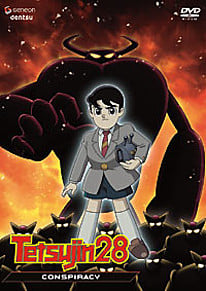Review
by Carl Kimlinger,Tetsujin 28
DVD 5
| Synopsis: |  |
||
The discovery of the Madara rocks changes Shotaro's entire outlook on life. Confronted with the true horror of the bagume, he must re-evaluate not only his views of his father but also his lifestyle and, most importantly, what exactly his relationship with Tetsujin is. Meanwhile Dr. Bigfire and the criminal organization known as the PX Syndicate join hands, forcing an emotionally unprepared Shotaro to once again take up his controller and fight, with potentially disastrous results. |
|||
| Review: | |||
Tetsujin continues to gain momentum in its penultimate volume, while still lacking that extra spark that would boost it from mild entertainment to engrossing epic. It hasn't the epic scope, emotional intensity, nor narrative ruthlessness with which director Yasuhiro Imagawa's Giant Robo carved out a reputation as a modern classic, but that doesn't mean that there isn't a good time to be had here. This incarnation of Tetsujin has always had some trouble with eliciting an emotional response from its audience. It has the advantage of choosing dilemmas that are easy to sympathize with, but the scenes often pass so quickly (or are drowned in a swirl of conspiracies and narrative twists) that they never get the chance to sink their claws in and drag the audience into the character's pain. The convoluted script wasn't such a problem in previous volumes where stories were restricted to a handful of episodes, but with the show winding towards its conclusion with a continuous storyline, things have gotten unnecessarily complex. As if covering for its problems with emotional involvement, the show throws intertwining conspiracies, enough antagonists to fill the red-herring barrel in an Agatha Christie novel, and a veritable parade of robots at its audience. There is some enjoyment to be derived from unwinding the twisted threads of the narrative and guessing at the true motivations and relationships of all the various players, but the less-than-stellar results make the effort feel somewhat wasted. No, the real fun in this volume is the evolving relationships and characters. Shotaro must come to grips with how powerless he is on his own, and with his father's crimes. Despite his own personal difficulties, Chief Otsuka comes through for Shotaro, displaying the depth of his paternal devotion to the boy. Nikoponski and Chloroform begin showing signs that their goals aren't as nefarious as first implied, and even Dr. Bigfire and the head of the PX Syndicate get a chance to prove just how compatible and comfortable they are with each other. But the real surprise this volume is Ms. Takamizawa, who in one fell swoop transforms from slappable hanger-on to indispensable ally. The family atmosphere that grows between her, Murasame, and Shotaro is simultaneously funny and strangely warming. Takamizawa for the first time becomes not just tolerable, but likable. That's a serious turnaround for someone who was absolutely insufferable just two episodes previous. Not much has changed in terms of the technical qualities of the show. The character designs and the backgrounds still have integration issues, the animation still manages to look better than it really is because of Imagawa's canny use of atmospheric effects (rain, snow, falling debris), CG effects (particularly explosions) and his skill at composing memorable images. This time out, the real standout is the climactic revelation about the source of Tetsujin's power. To say more would be unfair, but it is horrific, grotesque and riveting all at once. The background art still stands out so much that it only draws attention to how simple the characters look. And the mecha are still so silly that taking them seriously is very, very difficult. The score is a full-blooded symphonic effort that the director utilizes wisely, using it to raise tension and add excitement to the battles, while allowing quieter moments to carry themselves of their own power without drowning them in music. The opening and ending are still the old-school choral chants that graced previous episodes. On a side note, Hideaki Anno fans may recognize the ending theme as the music used for the recaps that began each episode of His and Her Circumstances. Like the other elements of this show, the dub has become comfortably familiar. It has the same strengths and weaknesses as previous installments. It is almost anally faithful to the original, the actors all have their characters down pat, and it sometimes reaches the same overripe heights of hamminess that the original aspired to. It also suffers from the weird pauses and awkward pacing that afflict many dubs that attempt to be too accurate, and the pronunciation of Japanese names is sometimes inconsistent. If you liked the dub before, you'll still like it here, and if you wanted to send hate mail to Geneon for the last volume, then get your pen and vitriol ready, because this volume won't change your mind. As if making up for the simplicity of the episodes at the halfpoint of the series, Tetsujin hits high gear, uncovering conspiracy after conspiracy. The Byzantine mess of plot threads—as welcome as they may be to some—threaten to overwhelm the fun character moments that give this volume its real charm, which is problematic in a show that already has trouble getting the audience to invest in its characters. |
|
The views and opinions expressed in this article are solely those of the author(s) and do not necessarily represent the views of Anime News Network, its employees, owners, or sponsors.
|
| Grade: | |||
|
Overall (dub) : C+
Overall (sub) : B-
Story : B-
Animation : B
Art : B+
Music : B-
+ Enjoyable character development, great background art, some striking imagery. |
|||
| Production Info: | ||
|
Full encyclopedia details about Release information about |
||